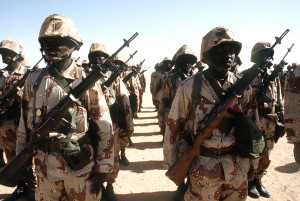The Boko Hararm, a militant terrorist group in Nigeria, attacked and took control of Monguno,Nigeria on Sunday. The town hosts a large military barracks and is home to 100,000 people. The group also launched an attack on the Borno State capital city of Maiduguri, 85 miles from Monguno, but did not take control. All this after the Baga Massacre earlier this year, in which over 2,000 people were killed.
Survivors of the recent attacks reported the rebels came through villages, slitting throats, looting and burning homes, and abducting women and children. Officials said these attack were a significant advance in a campaign to encircle Maiduguri that started last summer, as reported by The New York Times. More than 200 combatants died in the fighting, mainly insurgents, according to The Guardian.
 The town of Monguno, with its military barracks, previously acted as an important protection for Maiduguri. Now, with the fall of Monguno, the Boko Haram are in a better position to advance on Maiduguri.
The town of Monguno, with its military barracks, previously acted as an important protection for Maiduguri. Now, with the fall of Monguno, the Boko Haram are in a better position to advance on Maiduguri.
The two cities are in a strategic position in the northeast, near the neighboring countries of Cameroon, Chad, and Niger. Boko Haram leader, Abubakar Shekau, has expressed intentions of expanding the attacks to nearby Niger and Cameroon. According to The Wall Street Journal, Chad is presently spared from threats because of the French anti-Islamist military group, Operation Barkhane. Headquartered in Chad’s capital, Operation Barkhane has 3,000 French forces.
The Boko Haram killed an estimated 11,245 people in 2014, according to the Council on Foreign Relations. The Wall Street Journal reported these recent ruthless events by the Boko Haram, including the Baga Massacre, are due to a shift from insurgency tactics to governance. Following similar tactics of Islamic State of Iraq and Syrica (ISIS), Boko Haram is employing a warlord model for governance in the areas that take control.
These recent attacks come before Nigeria’s upcoming elections on Feb. 14. John Kerry, the U.S. secretary of state, visited Lagos, the nation’s commercial capital, at the same time of these attacks. He was there to encourage peaceful elections next month.
The New York Times reported, “Mr. Kerry said the United States was prepared to do more to help the faltering Nigerian Military.” However, “He warned that the level of American support would be influenced by the determination of Nigeria’s politicians to carry out a fair and peaceful election.”.

